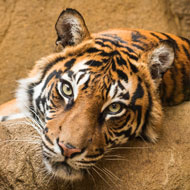
Investigation into keeper’s death still underway
A tiger that killed a senior zookeeper in Cambridgeshire will not be euthanised, the zoo has confirmed.
Rosa King was killed at Hamerton Zoo Park on 29 May after entering the tiger’s enclosure. The zoo is currently closed and a full investigation is being carried out by Huntingdonshire District Council.
A statement from the zoo says: ‘After extensive consultation with the staff at the zoo, we have decided not to put down the tiger. This decision has been fully supported by Rosa's family.
‘We are awaiting the findings of the investigation to fully understand what happened before we take further action on this matter. If we receive regulatory or professional guidance to the contrary, we will review our position.’
Rosa’s parents, Peter and Andrea King, said she ‘lived and breathed a vocation that meant the world to her’.
‘She had a care and understanding of her animals that was a joy and privilege to behold,’ they added in a statement. ‘Rosa was passionate about animals from the age of two when she first sat on the back of a horse. After that, her life was always going to be about animals.
‘She lived her life to the full and was a very caring, generous person. She would stand up for those who couldn’t stand up for themselves including the animals and campaigned and raised money for animal charities.’
Following her death, Hamerton Zoo said staff were still struggling to come to terms with what had happened.
‘Our thoughts and deepest condolences are with Rosa's family and friends, many of whom worked alongside her at the Zoo. Rosa was not only an invaluable and highly respected member of our team, first and foremost, she was our friend and we miss her very much.
‘Rosa's passion and commitment to animals and wildlife were an inspiration to all those who worked with and knew her.’



 The Veterinary Medicines Directorate (VMD) is inviting applications from veterinary students to attend a one-week extramural studies (EMS) placement in July 2026.
The Veterinary Medicines Directorate (VMD) is inviting applications from veterinary students to attend a one-week extramural studies (EMS) placement in July 2026.